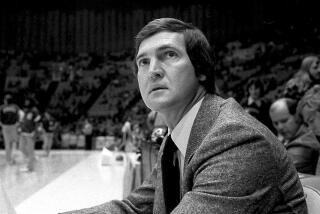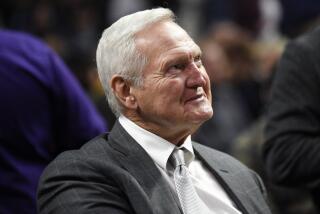He Put the Great in Salt Lake, and L.A.
- Share via
SALT LAKE CITY — Karl Malone brought an official end to his career here Sunday, right where it should end, in the same place it started.
We know Malone will always be thought of primarily as a member of the Utah Jazz, his team for his first 18 years in the NBA. But we learned something else this weekend: While the Jazz got the best part of Karl Malone’s career, we in Los Angeles got the best part of Karl Malone.
Malone’s No. 32 eventually will hang in the Delta Center and a bronze statue will stand outside to commemorate a career in which he set 23 Jazz records. Following a long discussion in October after Malone’s measurements were taken for the statue, Jazz owner Larry Miller told his wife that it was the most mature conversation he’d ever had with Malone.
That’s the Malone we experienced. The grown man.
His time with the Lakers in his final season will amount to only a couple of K in the gigabytes of statistics he accumulated. He wore Laker purple and gold for only 42 of his 1,476 games, and had the new No. 11 jersey on for only 554 of the 36,928 points he scored. But his presence in a supporting role on a star-laden team provided the same impact he had on the Jazz when he was winning most-valuable-player awards in the late 1990s. It got his team to the NBA Finals. He became the heart, soul and conscience of last year’s Laker squad.
“Everything that happens in your life and your career has to stick with you,” Malone said. “I hope, just a little bit, I left L.A., that organization, a little bit better than I found it. But it will play a part in my life. I think that year with them prepared me for a day like today.”
It was a day in which he shed no tears, though his wife and Miller were grabbing tissues. It was a day when he said, “I’m totally at peace with my decision.”
The recaps of his career in the Salt Lake newspapers duly noted the love-hate relationship he had with Miller and even the Utah fans in constant squabbles about money and respect.
“He acted childishly at times, kindly at others,” wrote Deseret Morning News columnist Brad Rock. “Nobody said maintaining a superstar was easy.”
With the Lakers, Malone wasn’t the high-maintenance vehicle; he was the mechanic. He made Kobe Bryant comfortable, lending an ear for Bryant to discuss the hardships of his life as he faced a sexual assault charge. He made Shaquille O’Neal accountable, whether O’Neal was following Malone’s lead by suiting up for an exhibition game or taking responsibility for a playoff loss. Malone gave the Lakers a steady, unifying force.
The difference for Malone was the passing of his mother after he signed with the Lakers. Suddenly he had a different perspective on life, and didn’t want to spend time worrying about the little ups and downs.
“Any adversity in your life, there can be some good,” Malone said Sunday, on his mother’s 67th birthday. “If I wouldn’t have lost my mom in all of this, I don’t think I could’ve dealt with my injuries. We all get humbled at times. Maybe that was my time to be humbled. When I lost my mom, it was kind of like, ‘I can handle anything now.’ ”
But what he couldn’t tolerate was the unnecessary breakup of the Lakers last summer, when the franchise core melted down over egos and money. All of that had more impact than the tabloid-ish incident in December when Bryant accused Malone of hitting on his wife. (Malone said his playful banter was misinterpreted.)
“I’m over that,” Malone said.
“It hurt,” he admitted. “When you open yourself up to a person, it hurt. And I can say that. But as far as bothering me, I got over that right away. It’s the things that happened in the summer that soured me there.
“Not just me, it soured a lot of people. And I think we’re starting to see the effects of that, because of the way it was handled. And everybody had [a part]. I look at the four: Kobe, Shaq, Dr. [Jerry] Buss, Mitch [Kupchak]. I don’t put Phil [Jackson] in it. I just put those four guys. All of those guys could have stood up and said, ‘Unh-uh.’ Or, ‘No.’ Fixed. See what I’m saying?
“That’s what soured me. Guys had an opportunity to be accountable, and they didn’t.
“Even with this [he pointed to the knee he re-injured during the playoffs that required off-season surgery] I was coming back. But after all that happened, if they don’t care, why should I care? Maybe I care for all the wrong reasons. I care for the fans. Because it was truly something special. But I don’t think everybody else cared for the fans like they say they did, because that was something you’ll never see again. Ever. I don’t care how you slice it. You will never see it again. Maybe I cared too much for that.”
What he found when he visited San Antonio last weekend was that he couldn’t care enough about basketball anymore to give the same honest effort that defined his career. His priorities had shifted, to family time more than the NBA grind.
And so an era ends. Malone was the last of the professional members of the 1992 Dream Team to call it quits.
Malone leaves as the NBA’s No. 2 all-time leading scorer, finishing 1,459 points behind Kareem Abdul-Jabbar. That fits the big knock on his career, that the “Mailman” never delivered when it mattered most, never wound up on top, couldn’t come through in three trips to the Finals.
“The all-time scoring title is not a concern for me,” Malone said. “The thing that will stick with me for the rest of my life is not winning a championship. I’m not going to lie to you. That was my ultimate goal. But it was a team goal, not an individual goal.”
Malone’s brief time with the Lakers was defined by sacrifice, from taking a scaled-back salary to a reduced role in the offense. What seemed like a mercenary pursuit of a ring turned into a demonstration of teamwork. As impressive as any Jazz solo.
*
J.A. Adande can be reached at j.a.adande@latimes.com. To read previous columns by Adande, go to latimes.com/adande.
More to Read
All things Lakers, all the time.
Get all the Lakers news you need in Dan Woike's weekly newsletter.
You may occasionally receive promotional content from the Los Angeles Times.







